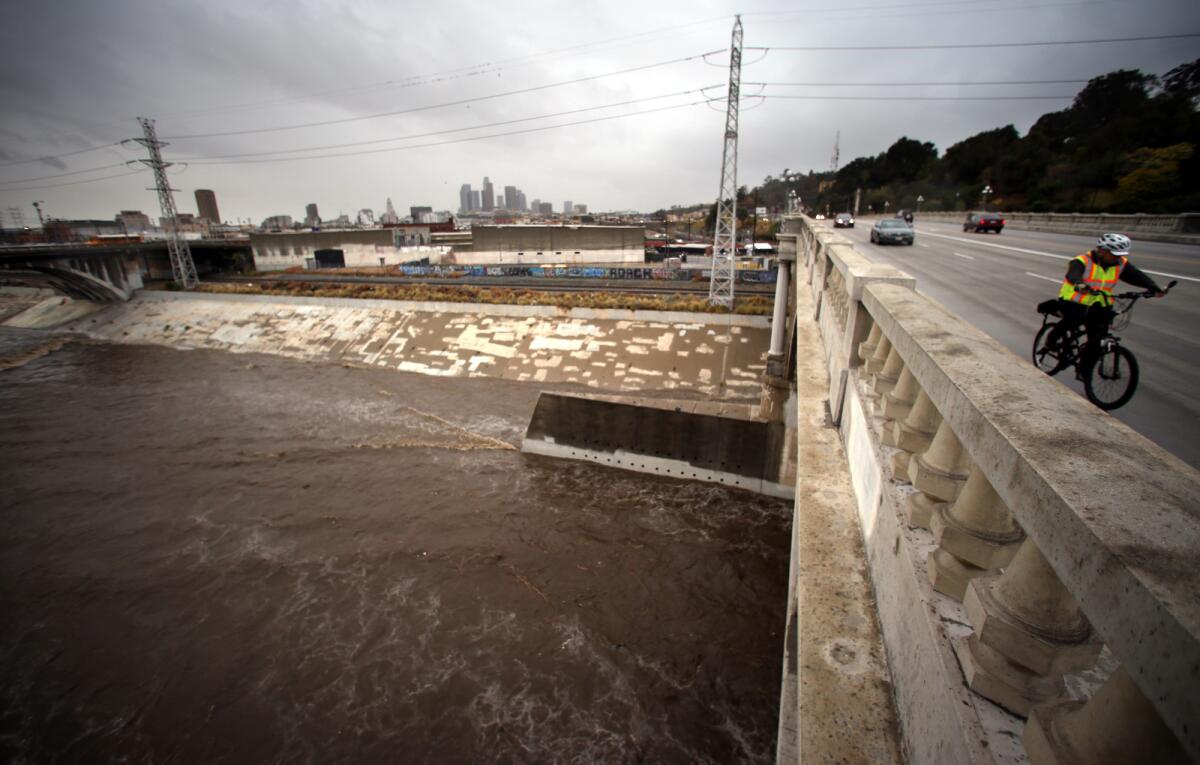L.A. County moves toward water fee for new developments, looks at stormwater funding

A man rides his bike across the Buena Vista Street Bridge as a swollen Los Angeles River flows below in Lincoln Heights in January. County officials are looking into ways to fund projects to capture more stormwater.
- Share via
Los Angeles County will consider new water-saving requirements for developers and look at tax options to pay for future drought planning under a pair of measures adopted Tuesday.
Over the objections of business and development groups, the Board of Supervisors voted to have county staff start drafting a “net zero” ordinance that would aim to ensure that new developments do not increase overall regional water demand.
That could be achieved through efficiency measures, using recycled water, or through offset fees that would go into water conservation programs.
A number of California communities have such “water neutral” policies, including Santa Monica, Oxnard and San Luis Obispo County.
The L.A. board’s move toward a similar program drew praise from environmental groups.
Rita Kampalath, science and policy director for the group Heal the Bay, said there has been a “disconnect between water agencies and planning departments” during California’s ongoing drought.
“Water agencies have been hearing the message of severe water shortages and have had to ask their customers to cut water use as much as possible, while simultaneously watching new development and major projects pop up without any clear accounting for the additional burdens on our already stressed water supply,” she said.
But business groups argued that the new requirements could result in less affordable housing being built.
“There is a real concern that a net zero water consumption policy that relies on offsets will drive up the cost of housing and exacerbate the current housing crisis,” Gary Toebben, president of the L.A. Area Chamber of Commerce, wrote to the board. He argued that new developments are generally more water-efficient than older units.
Supervisor Sheila Kuehl said the county has set aside a substantial amount of money to build affordable housing and disputed the business groups’ assertion that a water conservation fee would slow down building.
“I don’t think there’s as much of a conflict as you’ve said, and I don’t think the evidence really exists,” she said.
The board voted to kick off a yearlong process of gathering input and looking at existing policies before potentially adopting the new rules.
The board also voted to convene a group of city, water agency and school officials; business leaders and advocates to develop a drought plan that would include stormwater capture and clean-up projects. They also asked county staff to consider the best ways to pay for such a plan, including a potential tax initiative to be introduced in an election after November.
Three years ago, the county considered asking property owners to approve a new parcel fee to fund regional stormwater projects, but after vehement pushback from residents, businesses and school districts, the supervisors killed the measure before the ballots were mailed out.
Now, with cities and the county under the gun to implement stormwater management plans that are required under new permitting rules and could cost as much as $20 billion over the next 20 years, some of the supervisors want to make a new push.
“The county and all of the cities are under some pretty expensive guns right now about stormwater,” Supervisor Sheila Kuehl said.
Supervisor Michael D. Antonovich, who opposed the tax proposal the last time around, remained critical, saying it would hurt schools and homeowners and argued that the county should lean on the state and federal government to pay for the needed infrastructure to capture and recycle rainwater.
But his colleagues said the new process was designed to come up with a more palatable plan. Mark Ridley-Thomas, who described the previous attempt at a tax measure as “a hot mess,” said the proposed stakeholder process was intended to produce a proposal that would be “more palatable, more equitable” and generate less opposition.
Don Knabe, who opposed the previous proposed tax measure, agreed: “Not that you’re going to get kumbaya from all these entities, but at least they will feel like they’re at the table,” he said.
Twitter: @sewella
More to Read
Sign up for Essential California
The most important California stories and recommendations in your inbox every morning.
You may occasionally receive promotional content from the Los Angeles Times.














